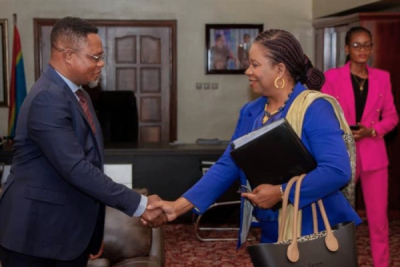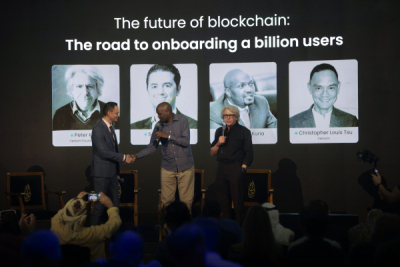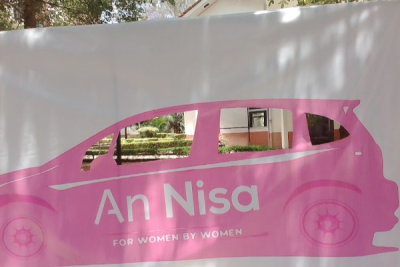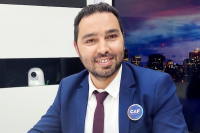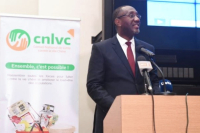African tech entrepreneurs are increasingly coming up with homegrown solutions to improve the daily lives of professionals in various sectors. Proptech, while not as prominent as other tech sectors, has its share of innovations.
reOS is a cloud-based proptech platform developed by a South African start-up. It helps rental professionals, agencies, and freelancers automate most of their monthly tasks such as billing, collections, payments, communications, and reporting. The Cape Town-based startup was founded in 2018 by Craig Buckley.
“There has been a great deal of excitement surrounding rental technology in recent years, with several new entrants to the industry. However, these companies have tended to focus on self-service, with direct-to-consumer models aimed at tenants, property owners, and landlords. For the most part, these products look to cut the agent out. reOS has taken a different view, recognizing that the greatest opportunity lies in enabling rental professionals to offer more value to their customers – at scale,” said Craig Buckley in 2020 explaining the rationale behind reOS missions.
Users can access the solution from its web platform and desktop application. Once they create their accounts, they can access services like lease and portfolio management, money management, financial reporting, and cloud storage.
The start-up offers several subscription packages. Its packages adapt to subscribers’ portfolios and the features needed. Currently, it operates in South Africa but it does not rule out future expansion. “While we don’t want to get ahead of ourselves, reOS was designed with international markets in mind and as a result that would be a natural progression for us,” Craig Buckley indicated.
Adoni Conrad Quenum
The organization wants to transform the agricultural ecosystem in West Africa. To achieve this, it offers training and workspaces and develops projects to support young entrepreneurs.
Founded in 2016, Yeesal Agri Hub is an innovative entrepreneurship support organization (SAEI) under the leadership of Awa Caba from Senegal. Its primary objective is to establish an ecosystem and deliver services that foster the economic growth of youth, returning migrants, novice farmers, and rural communities. The organization is dedicated to nurturing the skills and abilities of individuals interested in agribusiness, agritech, and the green economy while eliminating obstacles to entry into these sectors. Furthermore, Yeesal Agri Hub offers shared workspaces, platforms for promoting local products, and supportive environments to ensure entrepreneurs have optimal working conditions.
The organization has developed a dozen projects, including the Sandiara Agribusiness Innovation. This initiative aims to support rural entrepreneurs by introducing them to agroecological practices and assisting women's groups in the processing and marketing of agricultural products.
With partners such as Afric'innov, FAO, the United States Embassy in Senegal, the German Cooperation, and Broederlijk Delen, the hub has invested nearly 300,000 euros in agripreneurship. It has reached almost 1,000 direct targets and supported the design of six agritech tools.
In December 2022, it was selected to be part of the Rural Impacting Entrepreneurship project developed by the Small Foundation and Village Capital. In March 2023, it was also chosen for the Make-IT Africa project, a one-year program led by the German development agency GIZ, IRESEN (Institute for Research in Solar and New Energies), and impact agency Viridian Africa.
Melchior Koba
The dematerialization of public services and the construction of digital infrastructure are key components of the Democratic Republic of Congo’s digital transformation strategy. The proposals aim to support the implementation of those goals.
South African IT company Guma recently expressed its interest in the Democratic Republic of Congo’s digital industry. Last Thursday (May 4), Digital Minister Désiré-Cashmir Kolongele granted an audience to the company’s executive director, Maphum Nxumalo.
After the audience, Maphum Nxumalo explained that the discussions focused on digitalization, specifically on digital transformation processes. "We exchanged on the digital governance of the Congolese ecosystem, on how to make public information easily accessible to the population," he added.
The audience is granted in a context where the Democratic Republic of Congo is working to further develop its digital sector to greatly transform its economy by 2025.
Since 2019, through the National Digital Plan (PNN), the executive is working to modernize infrastructure, extend telecom coverage, boost access to digital tools, and secure digital content channels, among other things. To successfully implement that strategy, the country opened its doors to foreign investors specializing in digital technology.
Guma, which has over 30 years of experience in the field, wants to be one of such investors and provide its expertise in several areas including the dematerialization of administrative processes.
Samira Njoya
Last Tuesday, UNHCR representative in the Democratic Republic of Congo, Angèle Dikongue-Atangana (photo, right), granted an audience to Congolese Digital Minister Désiré-Cashmir Kolongele (photo, left).
The two parties agreed to strengthen their collaboration in the digital sector, particularly in the management of population data through the upcoming implementation of a unique identification system.
The system will allow the general identification of every resident, including citizens, refugees, and aliens.
Over the past five years, Kenya has made significant progress in the ICT field. The country is now a digital hub attracting several multinationals. It still wants to consolidate that position.
On Wednesday, May 10, Kenya signed a partnership agreement with Venom Foundation, a foundation specializing in crypto development and licensed by Abu Dhabi Global Market (ADGM), an international financial center and free zone located on Al Maryah Island, Abu Dhabi, United Arab Emirates. Under the agreement, a state-of-the-art hub dedicated to the creation of new blockchain and Web3 applications in Africa will be established in Nairobi.
"The Kenya Blockchain Hub will provide essential tools and resources to support African nations in building a robust foundation for digital transformation. By implementing blockchain-based solutions, we aim to promote transparency, efficiency, and trust throughout the continent. [...] The benefits of this partnership will extend both nationally and globally, improving lives and unlocking potential," the Venom Foundation tweeted.
Blockchain is a storage technology that keeps track of a set of transactions in a decentralized, secure, and transparent manner. It offers high standards of transparency and security, as it operates without a central control body. It can be used in various sectors, including finance. This partnership demonstrates the growing interest that blockchain and related technologies are gaining in Kenya. Global cryptocurrency exchange Binance reports that about 8.5% of Kenya's population (4.25 million people) own digital currencies. This growing craze is currently driving the government's desire to introduce a 3% tax on digital assets in the next fiscal year.
Although there is no national strategy on blockchain and related services yet, the market is growing and changing. The Kenyan government, aware that it cannot curb people's adoption of new technologies because it still lacks the right regulatory framework, has taken security measures by developing a Sandbox through which new technologies, software, and other services can be tested in a safe environment before being made available for consumption.
Before the public initiative with Venom Foundation, an almost similar private initiative had already taken shape in October 2022. That month, the Swiss-based nonprofit NEAR Foundation announced the launch of the Regional Blockchain Hub in Kenya in partnership with Sankore, a NEAR Foundation guild based in Kenya. The Kenya Regional Hub's mission is to accelerate blockchain innovation, education, and talent development across Africa.
Samira Njoya
While on-demand transport services are undeniably useful, they are not without their problems. In particular, women who use these services have reported incidents of harassment, which highlights the need for measures to improve safety in the on-demand transportation sector. An Nisa Taxi is one such solution that seeks to make the industry safer for women
An Nisa Taxi is a women-only taxi service developed by a Kenyan start-up. It allows women to commute safely without being harassed and enables women drivers to do their jobs peacefully. According to founder Mehnaz Sarwar, the startup has a team of women drivers and caters to women and children. “We also offer monthly packages for parents and working women. [...] We empower our drivers by offering them better rates while working in a safe environment for both our drivers and customers,” she added.
Currently, the solution only has an Android app, with the iOS version still under development. Using the app, users can create An Nisa accounts and access various services. They only need to choose the type of car they want, and depending on the route and location, the app suggests the closest driver. Users can then book their rides, wait for the driver to arrive -and even follow them in real-time- and pay. An Nisa Taxi's policy is so strict that a woman cannot take a cab with her partner unless it's an emergency.
An Nisa derives its revenues from subscriptions, partnerships with companies, and margins on daily rides. The startup collects a 15% commission on the rides performed by its “self-employed” drivers. To work with An Nisa, drivers need to own their cars and pass the verification process.
The startup is still self-financed and has not yet attracted outside investments despite its strong growth in recent years. According to its figures, it reached the 10,000-user mark this year and hopes to expand to Saudi Arabia, where it has many partners.
Adoni Conrad Quenum
With over 40 years of experience in technology, corporate leadership, and venture capital investment, he founded LifeQ, South Africa's top independent provider of biometrics and health information obtained from wearable devices
Laurence Olivier is the CEO and co-founder of LifeQ, a South African-based technology company that specializes in wearable health technologies. He obtained his bachelor's degree in electronic engineering from the University of Pretoria in 1980. Additionally, he holds a Bachelor's in Advanced Finance and Strategic Marketing and a Diploma in Data Metrics from the University of South Africa in 1984 and 1986, respectively.
He established LifeQ in 2014 with Franco du Preez and Riaan Conradie to empower people to better understand their health and well-being. By harnessing its sensors, LifeQ provides commercial-grade, near-clinical health information feeds that generate health and wellness solutions for consumers, businesses, and clinical applications.
The company’s innovative solutions have attracted major brands such as Tag Heuer, Louis Vuitton, Hublot, Montblanc, Fossil Group, Samsung, Suunto, Xiaomi, and Motorola, resulting in numerous partnerships.
"LifeQ offers a 24/7 lens into the body, generating actionable health insights from personal wearable devices and assisting in screening for disease and illness and uncovering its root cause," said Olivier in February 2023.
In April 2023, the tech entrepreneur launched the first phase of LifeQ's virtual, personalized, preventive, and real-time care platform at the Health Information Management Systems Society (HIMSS) in Chicago. That same month, the company was selected as one of the 40 African start-ups participating in the first edition of the Africa Unicorns program.
Besides LifeQ, Olivier is a partner at venture capital firms 4Di Capital and Veritas Venture Partners. He also serves on the boards of Transatlantic Venture Management, Global Nutrition & Health, and the University of Pretoria, among others. From 2006 to 2009, he served on the boards of the Atlanta Venture Forum and the Jewish Federation of Greater Atlanta.
Melchior Koba
At a time when protecting sensitive data and enhancing cybersecurity are seen as a challenge shared by African countries, experts are increasingly advocating for public and private actors to pool efforts to sanitize the cyberspace.
On the sidelines of the Cyber Africa Forum (April 24 -25, 2023) in Abidjan, Youssef Mazouz, Secretary General of the African Cybersecurity Center, agreed to be interviewed by Ecofin Agency and We Are Tech on the vision of his center and its solution to common cybersecurity challenges in Africa.
We Are Tech: Hello Dr. Mazouz, as the Secretary General of the African Cybersecurity Center, what do you think is the current need for cybersecurity professionals in Africa?
Youssef Mazouz: Hello, I am Dr. Youssef Mazouz, as you mentioned. I work a lot in cybersecurity through an NGO that brings together cybersecurity professionals, security and information system managers. Africa has been undergoing a digital transformation in recent years and there is an obligation to support this digital transformation by controlling risks and cybersecurity. The threats are there and African organizations are now taking the protection of their data and their IT infrastructure seriously. So, cybersecurity is becoming a critical field that should follow the development and changes in the digital world.
The CAF, which brings us together around this theme, focuses on this crucial subject. Unfortunately, most of the top managers of African organizations are not yet aware of the importance of cybersecurity. For them, it is a cost item, so events like this are essential to show that cybersecurity is an area that must be taken seriously because if we do not take into consideration the protection of data, we can face huge losses. We have examples of companies that have lost millions while others have had their businesses shut down for some time due to a cyber attack.
WAT: Do you feel that the continent currently has the human capital to protect its institutions against cyber attacks?
YM: You mentioned a key element, which is the human element. Truly, there are some technology components. There are many data and infrastructure protection as well as cybersecurity solutions. However, if there is no human talent to make the solutions work or back them up, the technologies won’t offer optimal protection. It is, therefore, necessary to support Africa by setting up continuous training, building skills, and opening cybersecurity research centers and universities. Moreover, we have an agreement with a university in Morocco to start cybersecurity research and build skills capable of following this evolution in the field of data protection and infrastructure protection.
WAT: What do you think are the main challenges to skill-building in African countries?
YM: The first challenge is how to keep our talents. Africa has skills but the problem is the exodus. They leave because there is a strong demand for digital skills elsewhere. We see engineers emigrating to Canada or Europe to work there. So we must keep a space capable of absorbing our talents in Africa. We must set favorable conditions for them to work and provide incentives to stay on their continent and in their country. I know that most of these skills want to stay in their countries, but they find out that they are not offered optimal working conditions. That is why they leave. We thus need to retain them.
WAT: So, you are suggesting public investment in the sector should be improved?
YM: Of course. Governments need to invest in research and training. They need to realize that information systems are value-creation tools, not cost items as they think. They can create value with a safe and efficient digital transformation.
WAT: What are your recommendations for the improvement of the supply of skilled professionals on the continent?
YM: I think the first thing is to have a synergy between countries by pooling skills and exchanging expertise. There are experts everywhere on the continent, so we must capitalize on them. This is why we have created the African Center for Cybersecurity, which brings together cybersecurity professionals. The center’s first goal is to build synergy between cybersecurity professionals in Africa. Last year, we launched an initiative to create an African cybersecurity alliance that brings together professionals from 12 countries for now. The information systems security manager (ISSM) or cybersecurity engineer cannot live in isolation, because new threats come up daily. There won’t be effective protection if cybersecurity professionals fail to share information on those threats. That's why we need to build this synergy and create an exchange network to develop expertise and develop threat information sharing.
WAT: How does the African Cybersecurity Center work with governments and businesses to strengthen the security of information systems in Africa?
YM: The center is an NGO and as such it has a lot of leeway as a civil society organization because it does not report to states. That is why we have insisted on this civil society model to have a wider scope of work. We work in collaboration with States and governments by organizing seminars, awareness days, etc... We also work with the private sector through exchanges and training with their CISOs. To share expertise with cybersecurity professionals, we also organize thematic days.
WAT: What steps should African governments take to strengthen cybersecurity regulations and protect citizens against cyber attacks?
YM: The first thing is to work under the umbrella of the African Union (AU). We know that the AU established a Cybersecurity convention in 2014 in Malabo, but as of 2022, only 13 out of 55 countries had ratified that convention. This shows that countries have not yet reached the maturity to create this cybersecurity momentum on the continent.
In Europe, they have the GDPR (General Data Protection Regulation, ed.), which is a law imposed not only on European countries but also on African countries and other continents. So if you want to work with Europe, you have to respect the measures mentioned in the GDPR. Why can't we create a regulatory framework under the aegis of the AU which would be an equivalent of the RGPD to keep and ensure the digital sovereignty of the African continent, that is to say, to protect the African data, of Africa and for Africa. So when we work with providers from Europe, they will have to comply with this legislation.
WAT: Have there been any recent developments in cyber security in Africa?
YM: Africa is undergoing fast digital transformation but, cybersecurity measures are slow to follow. This is due, on the one hand, to the difficulty of establishing a cybersecurity culture, because as I mentioned, decision-makers are not yet really aware of cybersecurity. So, to accelerate this cybersecurity process, we first need to work on raising awareness, involving the media, and talking about cybersecurity as a very important area. We also need to start investing money in the sector, through the creation of data centers for Africa and why not exchange with African countries to create a data center for Africa to protect sensitive African data without having to host them with a foreign provider over which we have no control. So we must invest in African infrastructure for Africa.
We must also back this process with quality training and ensure optimal working conditions for cybersecurity staff. Finally, we must establish the laws and regulations necessary to accompany these developments.
WAT: How is the African Cybersecurity Center adapting to the evolutions in the African cybersecurity sector?
YM: Of course, we have African experts that we are proud of. We do not rely on foreign experts. And these experts work on support, and the implementation of awareness guides distributed to companies and members. We also create vulnerability bulletins by discussing with our local members who are CISOs. This means that if a threat or a risk is detected by one of our members or collaborators, we integrate it into a monthly vulnerability bulletin that we distribute. So there are several practices that we implement in the center to try to create a movement or a synergy in the field.
Interview by Moutiou Adjibi Nourou and Muriel Edjo
Twitter CEO Elon Musk (photo) announced in a tweet published on Thursday (May 11) the launch of the first version of encrypted direct messages on the platform. The feature allows subscribers to communicate without the platform storing their messages, which will only be available on their devices. Musk also mentioned that other features, such as voice and video calls, will be added 'soon’.
The Ivorian Minister of SMEs Souleymane Diarrassouba (photo) launched on Monday (May 8), a mobile application to fight against the cost of living crisis and monitor market prices.
According to the government official, the app dubbed “contrôle citoyen” allows any resident to report illegal pricing practices, the sales of outdated goods, and merchants who fail to display their prices.
More...
The solution was launched by two foreign students in Mauritius as they believe the country is the best place to start, to quickly penetrate Southern African markets.
Vite is a digital solution developed by a Mauritian start-up. It allows users to book rides and parcel deliveries.
Through its mobile app, accessible on Appstore and Playstore, users can use its on-demand transportation services or even request the delivery of items like food, spice, etc as well as send for an errand. The platform integrates a WhatsApp link for users to report any issues that arise.
The solution claims more than 700 partner drivers, over 10,000 customers served and more than 24,500 trips and orders completed. To improve its efficiency, it is partnered with various entities. For example, it provides delivery services to more than 250 restaurants.
Based in Grand Bay, its founding startup was launched, in 2017, by Isaac Agyemang and Ukeme Augustine Jonah, two foreign students. Commenting on why it was launched in Mauritius, Vite’s chief marketing officer Anthony Takyi said: “If you are going to do business and get things smoother than smooth in Africa, Mauritius is certainly the starting point. It is the gateway to the SADC region.”
In 2020, the startup completed a funding round of an undisclosed amount to develop its technology and accelerate its growth. It is growing steadily and hopes to expand into the sub-region in the coming years. To date, its Android app has been downloaded more than 10,000 times from PlayStore.
Adoni Conrad Quenum
Despite significant investment by the government in mobile telecommunications services, a significant portion of Nigeria's population still lacks access to them. Parliament is seeking answers regarding the reasons behind this delay.
The Nigerian House of Representatives on Tuesday, May 9, launched an inquiry to determine why the Nigerian Communications Commission (NCC) has failed to promote the widespread availability and use of mobile telecommunication services throughout the country, especially in rural areas.
The investigation also seeks to question the use of the Universal Service Provision Fund (USPF), which was established by the federal government to facilitate the achievement of the universal service objectives in rural, unserved, and underserved areas.
“It is therefore critical to note that it is not only people residing in urban areas that have the right to telecommunications, consideration should be extended to rural dwellers. [...] The NCC as the regulator needs to ensure proactiveness in ensuring qualitative and efficient services are offered by the telecommunication operators,” said Femi Gbajabiamila, the Speaker of Parliament, at the first public hearing organized by the ad hoc committee of the House of Representatives.
According to NCC figures, Nigeria had 227.1 million mobile subscribers as of February 2023. While this figure represents a penetration rate of around 110 percent, the actual numbers are lower because some subscribers have multiple SIM cards. The NCC estimates that about 27 million Nigerians do not have access to mobile telecommunications services.
So, for three days, NCC officials will be questioned about the 1,014 contracts funded through the USPF, including a digital library project that cost over NGN2 billion ($4.3 million).
Samira Njoya
He founded KondjiGbale to help doctors fulfill their lifesaving tasks. The startup has been celebrated in Togo and beyond and won him several awards.
Yvon Koudam (pictured) is a Togolese entrepreneur and co-founder/CEO of KondjiGbale, a start-up that aims to facilitate access to healthcare.
His startup, founded in 2019, develops medical technology solutions to simplify the daily management and monitoring of people's health. Through its platform, doctors can access patients’ medical records. Patients can also access teleconsultation services every day from 6 am (Togo time) to midnight and order medication by sending their prescriptions. It also lists on-call pharmacies and gives users the possibility to set medication schedules.
KondjiGbale is accessible, in local languages, via many channels including a mobile and web app, a USSD code, a call center, and SMS. It is partnered with three health centers and over 34 health professionals. To date, it has some 5,165 patients and over 500 consultations booked.
In March 2023, Yvon Koudam represented his country at the Brazzaville International Youth Leadership Forum (BILYF). He shared his knowledge and experience on the panel: "Sustainable Development and Digital Economy".
Between 2016 and 2022, the entrepreneur worked as a programmer analyst in the start-up Clin Sarl U in Togo. In that position, he supported the design, programming, and development of applications for clients and companies such as TMoney and AgriStore. In December 2021, he was a guest speaker at the Emerging Valley Summit. Since December 2022, he is the Delegate of the Youth Innovation Week in Togo.
Through his startup, he has won several competitions, including the Pitch Your Startup Idea organized by Enginnova, the French Embassy in Togo, and the Togo Innovation Challenge of the Ministry of Grassroots Development in 2019. A finalist in the Hacking Covid-19 Africa competition initiated by HEC Paris in 2020, he was also among the 10 finalists of the fifth edition of the RFI App Challenge.
Melchior Koba
Adaverse, a Cardano blockchain accelerator focussed on Africa and Asia, announced on Tuesday (May 9) its investment in BitSport, a blockchain-based Web3 gaming platform founded by Victor Ogunshina and Charles Adenuoye. The amount invested was not disclosed.
"Bitsport’s AI-powered Web3 gaming platform represents the future of gaming, and we are thrilled to be a part of it. Adaverse’s investment in Bitsport highlights our commitment to supporting the development of cutting-edge technology that has the potential to revolutionize the gaming industry," said Vincent Li, founding partner at Adaverse.





